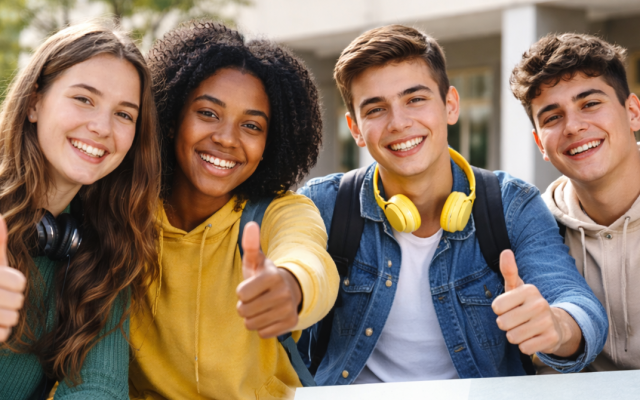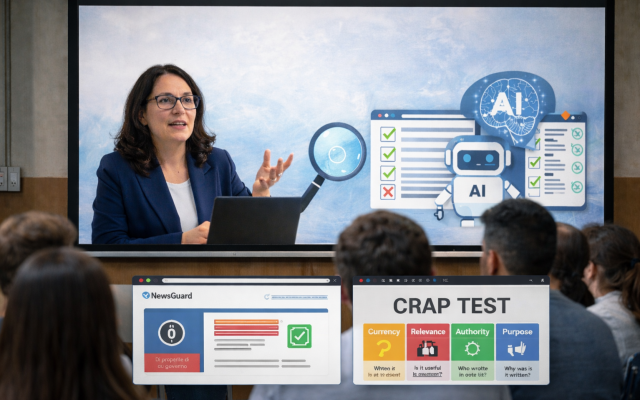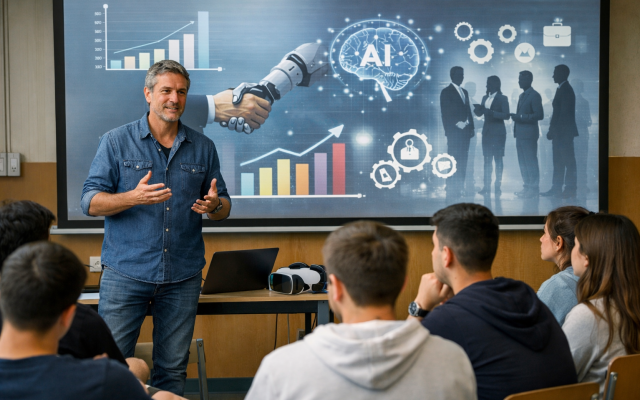Today, our weekly meeting with “Our School” Professors takes us to Piedmont to meet Catia Santini, Professor of English Language and Culture at the Liceo Giordano Bruno in Turin. As the school’s digital coordinator Prof. Santini loves didactic methodologies for mixed environments. Moreover, she is also part of the Piedmont Educationl Team.
As usual, we share a short presentation video and then an interview conducted by Ilaria Gaudiello, who coordinates the works of the open source community of teachers.
INTERVIEW
How do you imagine the future of school?
I am profoundly convinced that the future of school is already here. It is based on great challenges and renewed courage. It’s the school that has come into existence following the digital acceleration driven by the Covid-19 pandemic. We will learn from our errors and not go backwards but move forwards into the future. As indicated by the Blended Learning Guidelines in the Integrated Digital Didactics Plan, space and time are the two coordinates on which the most significant changes will take place.
Space means that school will no longer only be a place, but a learning dimension. School will no longer be a building, but a set of real and immaterial spaces in which we can share, analyse, experiment, compare, reflect and discuss. Time, in terms of the organisation of school activities, will have to be profoundly reconsidered. It’s not just about understanding and managing synchronous and asynchronous time, but about providing more time for learning and teaching.
Evaluation will regain its original etymological meaning: promoting. At the same time, the design of activities and courses will be the key element for the educational success of students. Between time and space, speed will lose its supremacy and favour reflection, reasoning, analysis and debate. School will no longer be about who comes first and with the most points, but we will promote strategies of those who arrive at excellent conclusions employing divergent thinking. And finally, I’d like a school that is more inclusive in its approach and curriculum, one whose primary objectives is the physical and mental well-being of the entire community.
In any case, what most concerns me about the school of the future is the following issue: what role will school reserve for digital skills for the 21st century citizen? European statistics clearly show the vast gap between Italian schools and that of the countries that are most advanced in the field of education, as they also highlight the low digital instruction of citizens and the disinformation risk amongst youth aged 14-35.
In the school of the future, I would like there were more space and resources for media and communications education, for computational thinking and artificial intelligence, with more efficient strategies and approaches.
If the Covid-19 pandemic has made us more resilient, we still have to understand if it has made us sufficiently courageous. Change requires courage to exit our comfort zones and routines. My pragmatism leads me to believe that there is a not unfounded risk that speaking about the future and change may only be a communicational strategy to cover a complete disinterest in the issue. Nonetheless, I have great trust in the school community.
As Shakespeare reminds us “It is Not in the Stars to Hold Our Destiny, but in Ourselves” [Shakespeare, Julius Caesar, Act I, Scene III, L. 140-141].
Can you tell us more about the didactic project that you would like to develop thanks to the support of “Our School”?
Like all other serial collectors, I’m full of ideas and projects that are lying around uncompleted. Choosing in these conditions is not easy, but amongst all of them my choice would fall on a project for book and film news trailers audio or video podcasts. It certainly is not an entirely original formula, although one of its innovative elements could be its declination as an interdisciplinary course for digital citizenship. It addresses areas 1-3 of the DigComp 2.1 (Research and evaluation of, interaction and sharing of information, development of content, copyright and patents) without overlooking its focus on respectful communication, the antithesis of hate speech. However, the true strong point of this small projects is in its formula: matching modern 21st century digital skills with the ancient lore of storytelling. Knowing how to create an efficient communications-level narration helps us not only to catch the attention of listeners, but also to understand the nature and objective of the messages and information that submerges us every day. Indeed, this is what helps us to distinguish facts from opinion, an essential skill to safeguard democracy and freedom of opinion.
What inspirational book or reading would you recommend to our community as a source of improvement?
Although I’m an enthusiastic on-life citizen, constantly seduced by the dynamic multisensorial nature of sounds and images, I believe that books – analogical books that we can hold and smell - continue to grant us new outlooks, opinions and thoughts.
In terms of outlook, my first reading suggestion is “Figure: come funzionano le immagini dal Rinascimento a Instagram” by Riccardo Falcinelli (Einaudip). This is a truly original book in which Falcinelli, who teaches Psychology of Perception at the ISIA Faculty of Design in Rome, explains how images, paintings, frescoes and photographs are planned and produced. Images are not understood as symbols to decipher but as mechanisms to take apart. They are addressed in the context of their producers and viewers. It’s a book that provides stimuli and precious reflections on how to develop dynamic presentations, infographics, web apps, images and digital augmented videos. I’m sure this essay will surprise you.
The second reading I would recommend is Jane McGonigal’s “Reality Is Broken: Why Games Make Us Better and How They Can Change the World.” The book, which is written by one of the most famous game designers and the Research and Development Director at the Institute for the Future in Palo Alto, provides stimuli and helpful reflections for all those who wish to learn more about Game-based Learning and Gamification (from escape rooms to videogames). With clear and efficient reasoning, the essay provides a theoretical introduction to gaming (how games work and why they attract us) and investigates the vast unexplored potential of games: what might if we began thinking about the solution to real problems like videogame designers? The essay is very easy to read and is full of helpful suggestions on how to make didactic problem-solving activities more interesting, significant and challenging.



